Miranda Kate's Blog, page 31
November 18, 2020
Mid-Week Flash Challenge - Week 175
This week's picture prompt is by Igor Zenin a Moldovian photographer. He calls it Sunset Run We've actually had another of his way back on Week 10! That one was called Dancing Trees - clearly he likes doing these (and I like using them).
Another snippet for you from my currently WIP - Tricky's first book. It's coming on nicely.
The General Guidelines can be found here.
How to create a clickable link in Blogger comments can be found on lasts week's post here.There is also a Facebook group for Mid-Week Flash, if you fancy getting the prompt there.

Sprites
Tricky rose early the next morning wanting to catch the dawn light. It also meant she didn’t have to shield herself when coming off the jetty to cabin as the world was still sleeping and despite the risks of the trees, she slipped off between them as the sky turned from ink black to grainy grey, still an hour off dawn. She headed towards the hillside out west of the village and climbed to the top where only the low lying shrubby pines could hold on, and she looked down over the rest of Clancy, spotting the fresh water lake off to her left. She made her way towards it, using spurts of energy to get there before the crack of dawn appeared on the horizon. It was the county’s water reserve, and fed the towns within. It was also an ancient site, having survived the shift unharmed. The forest nibbling at its edge had much to talk about, should it ever choose to speak, with much of the landmass having been turned over around it, yet it remaining intact. It was considered sacred and contained elements lost to all the other counties. It was patrolled, and few people were allowed into its realms, though Tricky knew at this time in the morning there would be no one to stop her.
Tricky wasn’t going there to raid it for elements, not this morning at least. Today she was here to see the sprites, which would be coming out soon for their morning cleanse. People had stopped believing in such fairy tales, which was all the better for them - and her. It meant they could exist in private and keep their purity, and meant she could visit them. Their energy was particularly valuable and she hoped to soak some up, if she could get close enough. They were shy and suspicious, and didn’t take well to any observer, particularly not human.
Humans didn’t believe trees were sentient. They saw them as solid and stationary, and unfeeling. They cut them down and used them for their own means - and Tricky had to be honest and admit she used them too, but she tried to be respectful when she did. Like populations of all living things, they needed culling from time to time. Trees had benefited from the recent cull of the human population. It had given them back land and air and returned many precious elements they had lost. Tricky was particularly interested in how they used them. She noticed species of trees unseen before, leaf shape and coloursomething new and seemingly unnatural. Green was no longer the standard in trees, dark purples and deep blues had been growing up amongst them. They brought with them their own types of energy, ones that Tricky found far more useful due to their intensity.
When she was within a metre of the water’s edge but still obscured by trees, Tricky sat down, making herself comfortable as she looked over the water. It was turning from a dark mirror, to one that had light rising from within it. The light along the horizon line turned royal blue and tricky watched as shrubs and bushes along the shoreline began to move.
They were like dancing ladies as they stepped out into the shallows. The edge of golden light growing across the water silhouetted them in her view. They splashed and cavorted, and twirled round. There were no faces, but legs and arms, and bushes at the tops that looked like heads. She wasn’t yet familiar with the reason for this ritual, she only knew they were the essence of trees that broke free and came to embrace the water. Was it their way of bringing water to the trees? She didn’t know. She only knew that once the tip of the sun crested the water’s far edge, they would rush back into the trees and not be seen again until the next morning. She had to be fast if she wanted to reap any nourishment from this visit.
Tricky took in a deep breath and stilled her thoughts, opening her mind’s eye and pushing her own energy up and through it, sending it out towards the water, feeling out where theirs was. When she touched the edge of theirs it sparked and flashed, but yet they remained oblivious. Each spark and flash sent a shot of electric energy back to her, which she absorbed until she reached a point where she thought her hair must be standing on end. Then she carefully pulled back her own energy, and sealed it up, mentally binding it back with her own body energy. Tricky felt full.
November 17, 2020
Guest Blog - Editing Process Q&A - Fred Nolan

Our next Guest Author is Fred Nolan, who gave me a really in depth look at his editing process.
Fred Nolan is a speculative fiction writer from Texas. He has published short stories, technical construction articles and one novel, (Alexei and the Second Empress, with Emery Press Books). He lives near McKinney with his wife, children and old retriever.Do you send a proposal before a book is accepted? Do you send in an outline first and get that okayed or do you go straight to the full draft?
I’ve only ever answered one call for a pitch, and it was rejected, so I might not be the right one to answer this. I sense that, these days, the more you can write and polish before having the agent or publisher look at it, the better.
Do you do several drafts before you send it to the publisher for editing, or do you just send the first draft?
I could never send a first draft, mine are too sloppy and overwrought. And as far as the number of drafts go, “several” is an understatement.
For novels, what I normally do is finish the first draft and immediately start working on known issues. For example, if I moved the main character’s home from the beach to the mountains, I’d start making changes and deletions with key word searches, for example sand, waves, and seagulls.
When the known issues are done, I let the book age. Unless you have a deadline, you shouldn’t look at it for at least a month. Three months is probably best. The idea is to let the writer’s natural defensiveness wear off, and, in time, be able to read the book like a reader.
After it ages, I do my first major read-through to get a feel for what I have, and look for major cuts. There’s no use in revising a paragraph until it shines if I’m just going to cut it.
The second read-through is for gathering a to-do list. I’ll identify crutch words, patterns in punctuation, look for issues with chronology, voice and so on. If changes occur to me I’ll make them on the spot, but this is more for finding global issues. Here’s a notable example: with my book’s early drafts, I leaned very heavily on conjunctions. That’s a pretty deep hole to climb out of, when you have to fix your sentences down to the DNA.
During this phase, if I find, for instance, six major things that need work, I’ll go through one at a time, six times in all, fixing only one issue at a time. Of course, there aren’t six things, there are usually one or two dozen.
By this point you’ll have a true mess on your hands. The book is still a first draft, but with a bunch of craters where you’ve made large cuts, and removed all your crutch words. This is, by all means, the worst of all the drafts. Time to polish.
What I do is go through a sentence at a time, modifying the book like an optometrist: “Better A? Better B? Better A or C?” After any change at all I go back and start reading from the last paragraph break. This is back-crushing work, and you fall out of love with the book pretty quickly this way. But that is a feature, not a bug. Once you’re tired of the book, it’s easier to cut paragraphs, move things around, put characters through more trauma, and so on.
By now I’m easily a month into revisions, if not two months, and not including the month I let the book age. Once I think the book is ready for beta readers I sign myself up first. I’ll read in a non-modifiable format at least twice, and try to get through the book without changing a thing. That never works, so those two readings become at least three.
The last reading is out loud. There is nothing quite like hearing a work you believe to be finished.
For those not in a hurry can I suggest letting it age for three months a second time? If you do that, you’ll still find things you that need changing. I know that sounds absurd, but it’s true.
What kind of changes/suggestions do they make? are they just minor ones or are they major? (any examples?)
I’ve never had a publisher suggest major changes, knock on wood. It bears mention, I’d rather a publisher suggest major changes than simply reject the submission. I believe that happened once with a short story submission.
Does it go through various stages, like developmental, copy editing and then proofing? Or is it straight into copy and proofing? Or again, does that vary on book and publisher?
If I limit my answer to novels, I’ve only published with Emery Press Books. Wendy’s edits were much less invasive than mine. I will say, she found misspelled words in three different languages (English, French and German) and she had some historical perspective on Imperial Russia that I didn’t have. But generally her remarks tended more toward proofreading and layout, and less toward developmental editing.
How many times do you go back and forth (on average) - does it vary with the publisher or with the story?
Once. I answer this question more fully below, but I try not to bicker with a publisher about edits.
What would you say best practice is in regards to accepting/rejecting edits - is there always a discussion, or do you feel you have to accept all/some of them?
With eight published works—one novel and seven short stories—I don’t think I’ve ever refused an edit. Negotiated, yes. Refused, no. I am the one being paid therefore the editor is my customer. We’ve all heard the saying that the customer is always right, and I suppose I’m old school in that regard. I believe my most aggressively-edited story was my most recent (Junk Mint, with The Gateway Review). The best advice I can offer is smile and nod.
When I say negotiated one specific example comes to mind. Wendy preferred a more conventional approach to numbers: numerals for ten and up, spelled-out words for anything less than ten. But I hate it when I see prose that reads: “By the age of nine, John owned 10 dogs.” I asked her to reconsider for all numbers to be spelled out, within reason, i.e. “By the age of nine, John owned ten dogs.” She agreed, but if she hadn’t I would not have insisted.
Do you find it hard to embrace the suggestions/changes given?
I’m glad you followed up with this question. Yes, I do, every time. When someone else changes my work, it is agony.
Even more than that, I cannot stand one-star reviews, lukewarm praise, poor book sales and promotional videos with no views. It’s always said that writers need to have thick skin but nothing could be further from the truth. We’re the ones with the souls made of glass; you don’t want a salty old ship captain writing books, you want to leave writing to the poets.
So be professional, be cordial, try to answer every email within two days. Do your research: make sure you know the editor’s name, manuscript wish list, preferred pronouns and form of address. That professionalism should extend to the editing phase, too, but by all means hold on to your passion. In short, don’t listen if someone tells you to develop thick skin. That is the opposite of what you should do.
Interesting. Thank you for taking part.
For more details about Fred's works, you can visit his website.
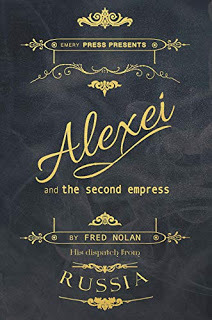
These are the final days of the tsars and Alexei Shafirov, an infirm skeptic, is bedridden after a fall. Throughout the long recovery his loved ones speak to him of fables, uprisings and a royal family under house detention. At the heart of their stories is Alexei Romanov, the heir apparent. Like him, the Romanov boy is a hemophiliac, near the center of a decades-old political cabal. Both children are prone to mischief, self-indulgence and illness. But some insist their connection runs deeper than that.
Alexei and the Second Empress is an account of the end of Imperial Russian, told in equal measures fairy tale and cruel realism. It is a story of opulence, folklore, addiction and secrets. And the most profound of those may not come to light without a price.
November 16, 2020
Review: The Last Resort, by SJI Holliday
 The Last Resort by Susi Holliday
The Last Resort by Susi HollidayMy rating: 4 of 5 stars
I do like how SJI Holliday comes up with these intriguing tales. This is another one that compells you to keep turning the page.
Seven strangers gathered on a remote island to experience what? That is the premise. It takes a sort of sci-fi twist (which might not go down well with devoted crime or mystery fans) which includes advanced technology able to access memories, and definitely has a very Black Mirror feel. But I wouldn't liken The Last Resort to And Then There Were None by Christie though, it was more like the film, The Game, with Michael Douglas. Nothing is quite what it seems.
Each chapter flicks between different character POV's, and also flashes back to something from the past, which is undefined. I would say that you are waiting for something to happen all the way through, and every now and then you are thrown a bone to keep you going, but really it is the last 20% where you get clobbered with it all, and it really does feel like that. It is a shock, and a cleverly played red herring really, but I liked the very end, which sort of twisted things again. Susi Holliday likes to do that and is what keeps me returning as one of her faithful readers.
Why not a 5 star? The ending made the rest feel null and void, as though there hadn't been much point to it really. Connecting with characters and getting invested and then wham! It was like another story being introduced, which might have been hinted at along the way, but felt added at a later stage. But it was sewn up well at the very end though, with a slight twist, which personally helped keep the books integrity.
View all my reviews
November 12, 2020
Guest Blog - Editing Process Q&A - Lizz Schumer
 Our next Guest author is Lizz Schumer.
Our next Guest author is Lizz Schumer. Lizz Schumer is a journalist, author, and educator. She currently works as the senior staff writer at Good Housekeeping, Woman’s Day, and Prevention magazines and her writing has appeared at or is forthcoming in The New York Times, VinePair, Serious Eats, Bon Appetit, HuffPost, Salon, Ploughshares.com, Entropy Mag, The Manifest-Station, Wordgathering, Punchnel’s, Ghost City Review, and many others. She also teaches journalism and communications at New York University School of Professional Studies and provides one-on-one writing coaching and workshops with The New York Writing Room.
Her first book, Buffalo Steel, https://www.amazon.com/gp/product/161... came out from Black Rose Writing in 2013 and her second, Biography of a Body, will be released by Unsolicited Press in January. It’s available for preorder here. (see details after the interview).
Do you send a proposal before a book is accepted? Do you send in an outline first and get that okayed or do you go straight to the full draft?
Because I am allergic to outlines, (despite realizing and fully acknowledging their utility!) I never do them for my creative work. I know many authors have queried outlines in addition to, or as a follow up to their query letters, and that it’s generally more common in nonfiction publishing than the work I do. I’ve seen a number of publishers request them for particular genres, but those aren’t the genres I’m working in, as a rule. I’ve always got a full, polished draft ready to go before I query, but I would never send more than requested at the outset.
I’ve never been commissioned by a publisher, per se. The way I’ve done it, I’ve always sent a query letter with however much of my manuscript each agent or publisher requests in their submissions guidelines online. That’s usually between 20-50 pages or the first couple chapters. If the editor likes what they see from the query letter and sample pages, they ask to see the full manuscript. Once they evaluate that, they send a publishing contract to sign. At that point, once I decide whether to work with them, we’d enter the three-stage editing process (developmental/structural, copy & proof).
Do you do several drafts before you send it to the publisher for editing, or do you just send the first draft?
Oh my goodness, my heart drops at the very idea of letting anyone see a first draft! No one sees my first drafts, and only my writing group sees the second, third, and sometimes fourth drafts too – and even that makes me nervous. My first drafts are generative; I put everything that might feasibly make it into the work onto the page and then cut, rearrange, edit, and polish from there. I’m a wordy writer (as you may be able to tell!) and I often say that it takes writing through a question to figure out my answer. I’d be shocked if anyone sent their first drafts to publishers, to be honest. That seems like a very risky move, and I’m certainly not arrogant enough to think my early drafts are good enough to see the light of day, much less an editor’s desk.
How many times do you go back and forth (on average) - does it vary with the publisher or with the story?
It really varies quite a bit. As a journalist, I go back and forth with my editors on my stories at least a handful of times, depending on how much our visions differ for how the end product should read. When I’ve worked with an editor for a long time, I can usually get to know what they’re looking for, and that cuts down the number of passes we need to make. I also try my best to submit clean drafts that are free from grammatical and syntactical errors and, when I have access to it, adhere to the publication’s style guide.
For my creative work, it varies widely. I’ve submitted to literary magazines that just give it a quick copy edit, and I’ve worked with literary editors who want to really shape and direct the piece together.
For both of my books, we’ve gone through a light developmental edit, then copy editing, then proofreading over a course of three or four passes that take a year or so.
What kind of changes/suggestions do they make? Are they just minor ones or are they major?
When I go through a draft with an editor, they’re really only fixing things like repetition or redundancy — in one manuscript, I’d repeated an anecdote twice in two different sections, for example — and any inconsistencies or inaccuracies, like misspelling Lego as LEGO or spelling a character’s name two different ways. I think that’s an interesting distinction between hybrid poetry and fiction, perhaps. Because I ensure that every word is really essential before sending a draft to my editor, there’s not much quibbling over which belong and which don’t. In that respect, my earliest draft is pretty much “finished,” to the extent that any work ever is!
The most dramatic edit that we did on my most recent book, and maybe this is another difference between genres, was adjusting the lineation so it read as intended once the book was formatted. I wrote it in Google Docs, and obviously the bound book will be quite a bit smaller, so some of the poetic sections looked very different in the new format, and needed to be adjusted so we could retain the intended meaning. In some cases, I had to decide whether to break up lines or insert additional spacing, and how to use first-word capitalization. We also discussed whether to use numerals or write out the title headings, since that creates a different experience, as well.
Another thing I did, which is another aspect of editing, was working very closely with my publisher’s cover designer to find cover art that represented not only the content but the tone of the work. We went back and forth a handful of times on font, title and byline position and sizing, until we were both happy with it. That’s one of the main reasons I choose to go with indie publishers, or have so far: I’m a collaborative writer and creator, so I really appreciated the opportunity to provide input on that aspect, as well.
Does it go through various stages, like developmental, copy editing and then proofing? Or is it straight into copy and proofing? Or again, does that vary on book and publisher?
Since I wrote hybrid poetic memoir, there aren’t really any plot holes, or really much plot, to be frank. My writing isn’t generally character-heavy, so that doesn’t particularly apply either. My manuscript really doesn’t really change much, content-wise, from the draft I first send to my editor, through the final product.
I try to submit clean copy, so there aren’t usually a lot of copy edits, but invariably a couple of things sneak through. I’ve had editors suggest that we reshape a piece a bit, enhancing some elements and pulling back on others. My favorite editing story actually comes from when I was studying for my MFA at Goddard College. One of my advisors there told me, “Not every story needs to be told verbatim,” and that really stuck with me. At the time, I was writing my way through my first book, and really struggling with which vignettes to highlight and which to gloss over. When I stepped back and considered the weight of each section and whether it really needed to be included, I came away with a tighter, more balanced book. I’ve applied that advice to literally everything I’ve written since, and I think it’s served me well.
What would you say best practice is in regards to accepting/rejecting edits - is there always a discussion, or do you feel you have to accept all/some of them?
In the best cases, there’s almost always some degree of back-and-forth. Some edits, like copy edits, aren’t really negotiable. The English language is what it is, with very few exceptions. I look at the editing process as a relationship, and there’s always some give and take in any healthy partnership. I trust that my editors are good at their jobs, that they believe in the work and want to send the very best version of it out into the world, and I know my editors know that I want the same, too. I tend to accept the vast majority of suggestions my editors give me, because I know that sometimes I’m just too close to what I’ve written to see it accurately after awhile. And an objective third party will almost always be able to pinpoint issues better than its creator.
That said, there have definitely been times in my journalistic work where editors have had a heavier hand than I’ve been totally comfortable with. I think all of us who have freelanced for any length of time have those stories. There’s one piece in particular, at an outlet that shall remain nameless, that rewrote basically the entire story and changed the voice so dramatically that it didn’t sound remotely like me. I considered asking to have my byline removed, and if it had happened today (now that I’m older and more confident), I would have advocated for myself more strongly. But it’s rare that even heavy-handed editing gets that egregious. We’re usually able to find a middle ground and the work that results is always better than it would have been without editing.
Do you find it hard to embrace the suggestions/changes given?
I used to, when I was first starting out. But now, I really value the editing process. You’ve probably heard the phrase, “kill your darlings.” I think that speaks to how emotionally challenging editing can be. Especially when you’re writing highly personal narratives, like I do, editing can sometimes feel like your own perception and expression of your very life is being questioned. But I look at the editing process as a journey toward refinement. There’s definitely a moment of anxiety when I first see a Google Doc full of comments and suggestions, but once I dive in, I actually get excited to engage with the work under an editor’s guidance. It’s fascinating to see a fresh perspective on something I’ve usually worked on for months or even years once it gets to that stage, and to collaborate with someone else on making it even better. It’s a humbling process, but one that makes me a better writer and creates a better result, every time.
T hanks so much for taking part in this blog series.
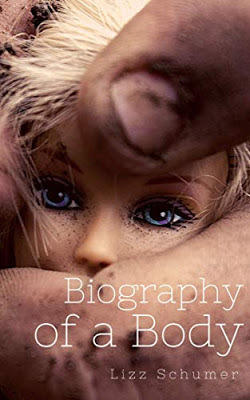
BIOGRAPHY OF A BODY is a lyrical meander through the development of a messy, flawed, imperfect human and what it means to live in a society that both pulls a person into itself and fiercely pushes back. In personal essays and snippets of verse that shift back and forth through time and place, Lizz Schumer fidgets with the puzzle pieces of a life that are at once starkly unique and glaringly obvious. Schumer probes the influence of religion on a person's psychological development, how the legacy of traditional femininity works their way under her skin, and the many pitfalls of living in a body that doesn't always conform to expectations, both from within and the world pressing on it. Follow her as she grapples with an eating disorder that threatens to consume her body and soul, undergoes a sexual awakening that reverberates through her social structure and understanding of herself, tries to find her place in a world where the rules are always changing, and fumbles to understand how much of her personhood is a compilation of outside influences she can barely pinpoint, and how much is wholly her own. This is less a narrative than a trail of breadcrumbs through an experience, where strange things whisper from the shadows and draw the reader into the dappled darkness. Readers will find themselves wandering along with her, grasping onto vivid insights and suggestions of feelings that will stay with them until long after the last page is turned.
November 11, 2020
Mid-Week Flash Challenge - Week 174
This week's image is an unknown. It's only been shared on twitter a handful of times, but no credit has been given.
As I am writing like mad for National Novel Writing Month, I thought I would use this prompt in that, and give a snippet of my Tricky story.
The General Guidelines can be found here.
How to create a clickable link in Blogger comments can be found on lasts week's post here.There is also a Facebook group for Mid-Week Flash, if you fancy getting the prompt there.

Foreboding
When Tricky rose the next day, dawn was breaking. She poked her head out of the little loft window and looked at the sky. Pink and orange reflected in the clouds that had gathered. She could still see a smidge of blue, but the darkness within the clouds was tainting the fading light purple. It seemed ominous somehow as she thought about what was ahead of her.
She was walking back into Clancy like butter wouldn’t melt in her new golden locks. She knew if there was a chance anyone recognised her she would be done for. People didn’t mess about, not with Carter in charge. They didn’t want to risk his wrath and would go squealing to him like a slapped piglet. And then walking into his house, into the rats lair, in front of all the people she had known for the last decade and more, and be a stranger in their midst, it made her stomach flutter like she’d just seen her first lover.
And Thatcher, what of him? Annie had warned her off. Could she resist him or was she too attached? She had to pinch his bum at least, she’d promised.
Questions flooded her mind about what was ahead of her, but she took a deep breath and pushed them back. One at a time. Time was something she had, and could create if she so wished. She looked forward to the sanctity of her new cabin. She could do what was needed to get her Obsidian back, and maybe any other treasures that dark weasel had got his hands on. But there were things she needed to gather first and she would do that along the way. Remferry bordered Delane just by a smidge, and she had secreted something there a long time ago, almost a century. She’d wondered if she would ever need it, and now she did. If only for peace of mind.
November 10, 2020
Guest Blog - Editing Process Q&A - Adam Stemple
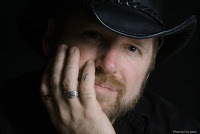 Our next guest author is AdamStemple is an award-winning author, poet, and musician.
Our next guest author is AdamStemple is an award-winning author, poet, and musician.Like most authors, his life experience is broad and odd. He spent twenty years on the road with a variety of bands playing for crowds of between 2 and 20,000 people. He started, ran, and sold a poker training site. He worked in a warehouse. He picked corn. He traded options and demoed houses. He drove pizzas for nine months in 1986, which for twenty-seven years was the longest he’d ever been employed. He drank too much and has now been sober for over fifteen years. He published his first book at the age of sixteen, “The Lullaby Songbook”, which he arranged the music for. His mother is a famous children’s book author. His children are artistic. His wife is a better person than him in nearly all regards.
Do you send a proposal before a book is accepted? Do you send in an outline first and get that okayed or do you go straight to the full draft?
The only books I’ve sold on proposals alone were sequels. I know several authors who sell proposals and won’t even write the book without a contract in hand, but they are big names.
Do you do several drafts before you send it to the publisher for editing, or do you just send the first draft?
I can’t imagine sending an editor a first draft. *shudders* If I have sold a book/story to a publisher, I send them something that I feel is ready for publication. That means innumerable drafts (though, in fact, I do number them).
How many times do you go back and forth (on average) - does it vary with the publisher or with the story?
Varies wildly. Short stories generally have the least amount of editing, though I went back and forth with one story for almost eighteen months before it got published. I've had stories go through verbatim. With books, it’s generally a more detailed process because the time frame is longer.
What kind of changes/suggestions do they make? Are they just minor ones or are they major?
I’ve had all different kinds. Depends on what the editor is looking for. Had one where the editor wanted all references to child abduction taken out of an adaptation of the Pied Piper. Would have been kind of hard to manage. Sometimes, it’s just some minor grammar changes. In general, the editor bought your book because they liked it, and therefore, major changes aren’t necessary. This is also a factor of selling books, not proposals.
I just had a great line edit from Rachel Brune, editor at Crone Girls Press. She caught a few grammar gremlins while also suggesting a few things for flow. It was clear from her suggestions that she understood what I was trying to do thematically with the story and I was happy to accept the changes/rewrite the paragraphs she suggested. I think I stetted* one thing.
*Stet – to leave in place, an editing/proofreading term.
Does it go through various stages, like developmental, copy editing and then proofing? Or is it straight into copy and proofing? Or again, does that vary on book and publisher?
Always been developmental, copy editing, then proofing for me - though some developmental editing includes copyediting, especially in small market short story sales.
What would you say best practice is in regards to accepting/rejecting edits - is there always a discussion, or do you feel you have to accept all/some of them? Do you find it hard to embrace the suggestions/changes given?
The pressure of wanting to sell something—anything—is immense for any writer. But you should still feel free to stet sections your editor wants changed. I deal with it by leaving notes on the parts I stetted explaining why I feel the change is unwarranted. Often in leaving that note, I realize that since I have to explain it, maybe I didn’t make myself clear enough the first time and rewrite the section anyway. My father always said, “You can deny the solution; you can’t deny there was a problem.” A professional reader thinks a portion of your story is weak; you should at least take a second look at it.
But if you find yourself at complete odds with an editor, you should consider whether the market is actually right for your story. It's a hard thing to do, but I have pulled out of sales—not after a contract is signed—but I have done it.
Maybe I’ve been lucky, but 99% of the editors I’ve worked with have been smart, sensible, and understanding of writers and writing. They’ve been as committed to putting out the best work I can do as I am. The relationship has never been adversarial as our aims are the same. And as much as a long editorial letter can be a horror when it appears in your inbox, if it’s a good one and the changes improve your story, it’s a gift and should be received as one.
Thanks so much for taking part in this blog series.
One last question, what projects are you currently working on?
Currently I’m promoting my latest novel DUSTER, out on Kindle and POD paperback, and a new story out with Crone Girls Press in THE WOMB OF NIGHT, a Midnight Bites anthology.
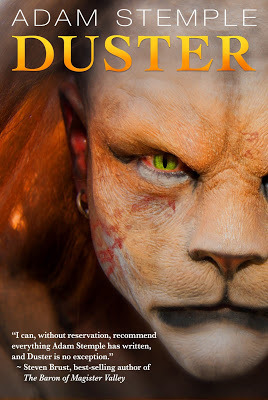
Invaders from the north. A missing son. A conspiracy that spans centuries. And the man at the center of it all has only a murderous pimp and a treacherous half-breed to help him.
The Dusters, a race of cat people from the north, have invaded and now former soldier Mika must make a grim choice: take up the sword again or watch everything he loves burn.
With his old friend from the military, Gair, and a mysterious, half-breed Duster, Mika makes his way from his Northern border home to the southern capital, across the frozen wastes of the Duster homelands, and deep underground where the legendary Gallochs dwell, desperate to unravel the mystery of the invasion and how it's connected to his origin. Hunted by his own kind and unable to trust his companions, he finds that to save his family, he may have to defeat not only the Duster army but the very Gods themselves.
Penned by award-winning author, Adam Stemple, Duster is an epic, page-turning fantasy that is dark, funny, and violent by turns and keeps the reader on edge till the very last sword stroke.
November 8, 2020
The Travelling Cat Chronicles by Hiro ArikawaMy rating: 3...
 The Travelling Cat Chronicles by Hiro Arikawa
The Travelling Cat Chronicles by Hiro ArikawaMy rating: 3 of 5 stars
I read this book for my bookclub. I was quite looking forward to it, but it was a struggle to read for two reasons. First was the translation: I felt this could have been edited better after the initial translation. A lot of sentences didn't read well and could have been reworked, and also some paragraphs.
The second was that it was a VERY long time until anything happened. It is a sort of aimless ramble about a guy going round his old school friends to see if anyone will take his cat. It is from the POV of the cat sometimes and that could be considered interesting, except it wasn't always. For more than half of the book you have no idea why he is trying to get this cat homed as he does have an apartment. With each friend he visits we go on a trip down memory lane about how he met them. We learn more and more about him during each visit, but it isn't until around 70% in that you find out why.
And really it is only the last chapter that really redeemed this book for me and make it a 3 star rather than a 2 star. Finally something interesting happened. Heartbreaking? Maybe. I didn't feel connected enough to the character to feel a great deal as I felt the narrative was very flat. Yes it is sad.
This is a 'Literary' book, hence it has won a ton of awards. I am still yet to understand why these sorts of books have such an impact. I feel that they are given an award and that is what attracts people to read them. They are put on a 'bestseller' list and thus people think, oh it must be good I will buy it. But personally, this was left wanting. Maybe in its original language it reads a lot better. Maybe there is a lot lost in translation.
I feel like I missed the point of it. Lovely cover though.
View all my reviews
November 5, 2020
Guest Blog - Editing Process Q&A - Vanessa Knipe
 Our next Guest author is Vanessa Knipe, a dark fantasy writer.
Our next Guest author is Vanessa Knipe, a dark fantasy writer.Born in Malaysia, Vanessa first landed in the UK at 3 years old. As a teen, Vanessa learned her love of canoeing in the alligator infested bayous of the Texas Gulf Coast. She now lives in Scotland and juggles fighting for a decent education for her Autistic son with wrestling the Creatures of the Night, though that’s not a nice thing to call her cat. Vanessa has concentrated on her writing since becoming widowed in 2001, as being a single mother of a disabled child made it impossible to work the required shifts in NHS Biochemistry laboratories. 2006 saw her beginning her writing career proper with the publication in the US of Witch-Finder, a collection of short paranormal adventures. She has had seven books published with two publishers, five still in print. She was recently awarded an MSc (dist) in Forensic Science from the University of Strathclyde.
Do you send a proposal before a book is accepted? Do you send in an outline first and get that okayed or do you go straight to the full draft?
Proposals are for non-fiction. I haven’t done non-fiction yet, but I understand the process. A publisher will commission the writer to write the manuscript off the back of the proposal. For fiction, I always follow a publisher’s guidelines; they usually have a helpful page telling prospective submitters how to make it easy for them. All the places I have submitted to have wanted the first three chapters and a synopsis. They recommend that the full manuscript is ready if they are interested because they could forget you in the time it takes to write the book after the submission. I don’t see the point in querying unless I have a fully prepared manuscript.
Do you do several drafts before you send it to the publisher for editing, or do you just send the first draft?
I have never sent in a manuscript for submission that hasn’t been the best I can make it. Most have gone through a minimum of 5 passes at editing by me. After the fourth pass I take it to my critique group and let them read it. The final draft incorporates suggestions from the group. After that I change the font from TNR to comic sans – it’s amazing how many errors are still in the manuscript even at that point. Finally, I draft a synopsis and start the submission process.
My first ever published short story, Granny’s Secret for Perfect Vegetables, went through an additional editing stage. I had to produce a script for a course I was taking and I chose that one. Along the way it acquired more action scenes and a better ending – so I wrote those into the short story and it was published. I learned a lot from that incident.
How many times do you go back and forth (on average) - does it vary with the publisher or with the story?
Two or three times at most. Both my publishers set deadlines once we started the process.
What sort of deadlines did they set? Were they short or long? Were they in depth edits that were going back and forth over or small things?
The deadlines were for the date of publishing. As I have worked with small presses the publishing dates were usually four to six months; I understand it’s longer for the larger presses. The time I spend with the publisher’s editor is different. They have two to three weeks for each book so it’s a rapid back and forth. Only one book had major edits because it needed shortening as the publisher had a maximum word count that I had breached. We rolled back to an early draft, which was shorter, and added in bits from the later draft that couldn’t be left out.
What kind of changes/suggestions do they make? Are they just minor ones or are they major?
For me it has mostly been copyediting at this stage, except for the book mentioned above. One book the editor pointed out that I had a love affair with a particular word – a time travel book where I called everything a Cchrono-something, like a Chronosploder for a time bomb, Chronostream for moving through time or Chronoshield protection againt a Chronosploder. So I had to cut back on that and come up with new words. I’ve actually done it again in a book I’m preparing for submission. This time I’m overusing the word Chaos. A critique partner pointed it out so I’m replacing Chaos with raw power, wild magic and uncontrolled force.
One book was rejected by a publisher, even though it was in the same series as he was running, because I had been so obvious with the wicked stepmother cliché. That was a
November 4, 2020
Mid-Week Flash Challenge - Week 173
This week's prompt photo was taken by Swiss Photographer Rene Burri, in Luxembourg Gardens, Paris in 1950. He died in 2014 at the age of 81.
I had this story in my head for a few days, but it's always finding the time to write that is my problem. And not really just that, but to actually get started and stop procrastinating!
The General Guidelines can be found here.
How to create a clickable link in Blogger comments can be found on lasts week's post here.There is also a Facebook group for Mid-Week Flash, if you fancy getting the prompt there.

Momento
He pushed the shovel into the ground leaving a mark. It was soft at this time of year, so it wasn’t difficult – not like it had been last year. He left a line all the way round until he had the shape he wanted. Then he put his foot to the edge and pushed in deeper, digging the earth up, and shovelling it off to his right.
There was something therapeutic about digging in the ground; Gus felt at one with nature, breathing in the forest air, hearing the birdlife in the trees. It was how it was meant to be, man out here in the wilderness doing his thing, not bothering anyone.
He’d been ‘off grid’ before the saying was fashionable. No one could find his place; there were no roads, no defined paths. He’d built the place with his own hands. He loved it up here. He’d tapped some of the water coming down from the mountains, which in turn powered what few apparatus he couldn’t live without.
He went into town occasionally, a handful of times a year, and was reminded why he’d left civilisation. People weren’t kind. They didn’t really care about the guy next door. They liked to think they did; they pretended to, to feed their own need to feel good. They needed to feel connected to each other to give them purpose. Gus didn’t need that. He felt connected to nature, and himself up here. That was all he needed. He didn’t like people. He didn’t want to see them or be with them, but there were certain items he couldn’t live without.
His dislike of people went way back, and if he really thought about it, it came back to one instance, one moment that had decided it all for him and brought his existence among the herd to a close.
He remembered it like it was yesterday. He’d spent a long time trying to fit in, and by the time he’d finished college he’d managed a pretend life. He existed in so far as showing up to events and places where others were, but that was all. If he’d dared to engage he was shunned. He was the nerd they didn’t want to notice. He was good for things like rides, going round his house and eating his cupboards empty, and borrowing money – money they didn’t think they had to give back.
But that day on the square it changed. He’d arrived late which meant a seat on one of the outer tables on the terrace the cafe occupied. It made it hard to keep up with what was going on and feel a part of it. And then he’d had to shuffle back to let someone get their chair out, and one of the legs of his had moved onto a metal grate and slipped through. He’d gone down with a crash.
They’d all noticed him then. They’d laughed and laughed. Not one of them got up to see if he was okay, or helped him. He’d cut his arm quite badly and grazed up the side of one leg, but they weren’t interested. Just lots of jeering and pointing until the entire square were looking.
He’d got up and pretended all was well and chuckled a little too. But once they had died down and gone back to their chatter he’d slipped away and gone home. He’d nursed his cuts and scrapes and nurtured his bruised ego.
But they hadn’t let him forget; ‘Gus the Grate Lover’ became a nickname, one he couldn’t shake. And each time it was explained to someone new, he was humiliated again.
During the term break he’d come up to the mountains on a hike to get away from it all, and decided to make the move. He’d never looked back since.
But he hadn’t forgotten, and every visit he’d take a momento back with him. He’d smuggle it up here in the back of his car, and lug it the last quarter of a mile, unless it was awake. Sometimes he’d keep it alive a while, but never too long. Then he’d bury it out here. Some of them were close, but most were further afield. He knew where each one was; he’d marked their graves in his own way. And this was the last one – the last of the group that had been there that day. He was relieved, but also a little sad. He liked being out here digging.
November 3, 2020
Guest Blog - Editing Process Q&A - Trevor Wood
 Our next guest author is Trevor Wood, a crime writer who recently won the CWA John Creasey (New Blood) Dagger Award, for his book: ‘The Man on the Street’.
Our next guest author is Trevor Wood, a crime writer who recently won the CWA John Creasey (New Blood) Dagger Award, for his book: ‘The Man on the Street’. The CWA is the UK Crime Writer’s Association and they host yearly awards called The Daggers. This means that Trevor is a veritable celebrity, so I am extremely grateful he agreed to take part!
His new book ‘One Way Street’ came out last week on Thursday the 29th of October, and is a follow up to 'The Man on the Street'. (see details after the interview.
Trevor Wood has lived in Newcastle for 25 years and considers himself an adopted Geordie, though he still can’t speak the language. He's a successful playwright who has also worked as a journalist and spin-doctor for the City Council. Prior to that he served in the Royal Navy for 16 years joining, presciently, as a Writer. Trevor holds an MA in Creative Writing (Crime Fiction) from UEA. His first novel, The Man on the Street, which is set in his home city, was published by Quercus in March 2020. He is represented by Oli Munson at AM Heath.
On to the questions:
Do you send a proposal before a book is accepted? Do you send in an outline first and get that okayed or do you go straight to the full draft?
For my first publishing deal I had already written The Man on the Street. I wrote it as a standalone but the publishers believed it had ‘legs’ as a series and gave me a two-book deal without requiring any outlines for the second book. Once I’d delivered the second bookWhat would you say best practice is in regards to accepting/rejecting edits - is there always a discussion, or do you feel you have to accept all/some of them?
I think you have to be grown-up about it. All the suggested edits come from a good place, everybody involved is trying to make your book the best version it can be. So I take every single suggestion seriously and try to make them work. Sometimes, if I understand the rational for a suggested change but don’t like the proposed solution I’ll change things in a different way than suggested. I’d say I probably end up accepting about 75% of the edits proposed. If I don’t accept things then, when I send back the new draft, I always explain why I don’t think the suggested changes were a good idea or why they don’t work in the context of the rest of the book.
Do you find it hard to embrace the suggestions/changes given?
Not at all. Ultimately I’ve got be happy with the finished book – it’s got my name on it after all - but I think if you have a sympathetic editor then most suggested edits will improve the book.
Thanks so much for taking part in this blog series.
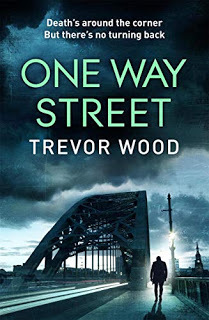
The word on the street is that a rogue batch of Spice - the zombie drug sweeping the inner cities - is to blame, but when one of Jimmy's few close friends is caught up in the carnage, loyalty compels him to find out what's really going on.
One Way Street sees the welcome return of Jimmy Mullen, the homeless, PTSD-suffering, veteran as he attempts to rebuild his life following the events in The Man on the Street.
As his probation officer constantly reminds him: all he needs to do is keep out of trouble. Sadly for him, trouble seems to have a habit of tracking Jimmy down.
Available from Amazon and all good bookstores - click on the book cover to be redirected to Amazon UK.


